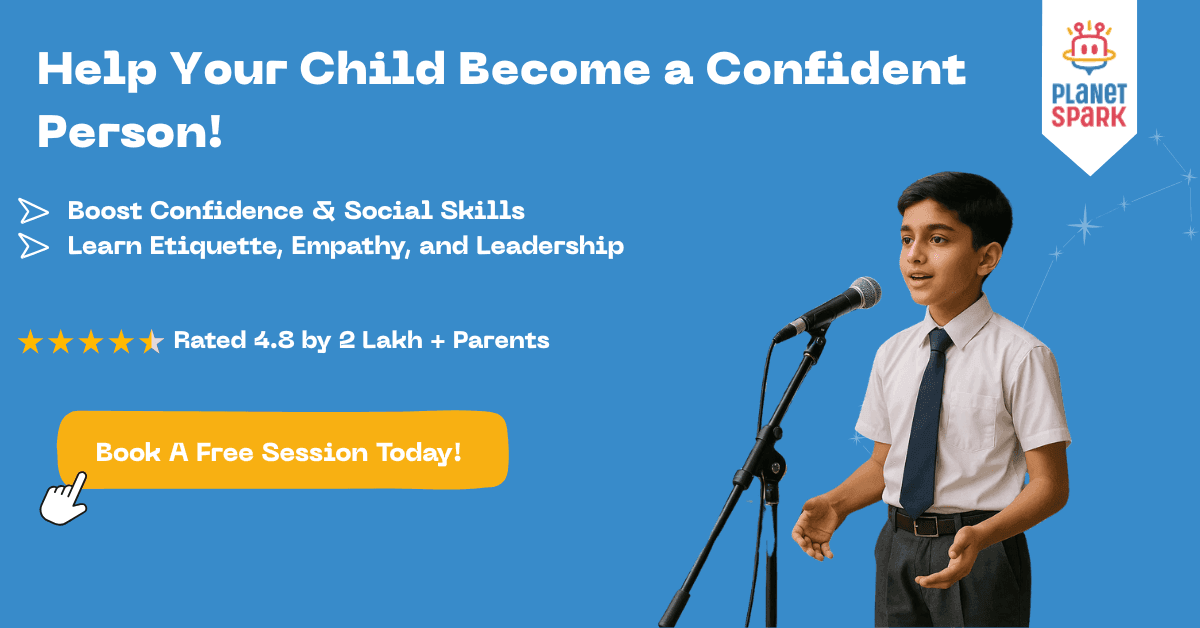Personality Development for Children - Importance
Last Updated At: 1 Jul 2025
14 min read

Table of Contents
- What Is Personality Development?
- Why Personality Development Matters for Kids
- The Role of Parents in Personality Development
- Role of Schools and Teachers in Personality Development
- Essential Skills and Traits for a Child’s Personality Develo
- Tools and Activities to Foster Personality Development
- Challenges in Personality Development and How to Overcome Th
- Long-Term Benefits of Early Personality Development
- Personality Development in the Digital Age
- Role of Personality Development Programs and Classes
- Conclusion
- About PlanetSpark
- FAQs
Academic success in today's dynamic and fast-paced world is no longer the only marker of how a child’s future will play out. Qualities like confidence, communication, emotional understanding, and adaptability are much more desirable for children once they begin their careers. Also known as personality, its development in children is not only an added asset alongside their education but also creates a formidable base on which their all-around growth is possible.
Their personality, once developed, shines through with additional attributes like confidence, resilience, and empathy. Through this blog, the helpful side of personality development is explored. It also offers a perspective on how parents and teachers can further support this aspect of a child’s overall development. At PlanetSpark, our personality development experts provide a fun and conducive atmosphere that aids your child in developing a personality that is wholesome, well-rounded, and emotionally aware.
What Is Personality Development?
The definition of personality development is the system through which a child’s innate characteristics are developed and improved. The process helps them gain qualities that improve attributes of behaviors, habits, and emotional responses. It thus helps in refining and shaping their nature, which includes the following:
- Creativity
- Problem solving
- Self-confidence
- Self-awareness
- Leadership and teamwork
- Empathy and emotional regulation
Previously, it was believed that a child’s personality, once formed, is firm and unchangeable. However, with studies and research conducted throughout the years, the above has been disproved. It is now widely understood and accepted, even by psychologists, that personality is dynamic and can be shaped through guidance, experiences, and education.

Why Personality Development Matters for Kids
The following points help understand why personality development for kids is important:
a. Builds Self-Confidence
Self-confidence in young children is still at a developing stage when they interact with known and unknown people around them. Through personality development classes, kids gain the courage to be able to express themselves. It helps them understand that their efforts are not only valued but also seen and appreciated, and they believe in their abilities. This quality of self-confidence also helps them in being an active participant and contributor when it comes to both academic and non-academic events.
b. Enhances Communication Skills
Another reason why personality development holds greater importance among children is due to the enhanced communication skills they develop. Due to the improved communication skills, once shy and introverted children can easily communicate, listen, and in the end create valuable relationships with people around them. Irrespective of the location and surroundings they are in, proper and clear communication is quite helpful as a core life skill.
c. Promotes Emotional Intelligence
It is often thought that kids are similar to undefined clay, and how they respond is based on what they have seen. Such a thought is extremely important when it comes to helping children create their response systems. Personality development classes conducted by PlanetSpark aid kids in understanding their emotions and creating healthy bonds and relationships with people around them. It also ensures that they respond with empathy and other similar positive responses towards other individuals.
d. Encourages a Positive Attitude
One of the most beneficial parts of personality development in children is the resilient attitude they create on their own. It provides them with a chance to respond positively to any sudden problems or setbacks they may encounter.
e. Fosters Leadership and Team Spirit
Along with the above qualities, the importance of personality development can also be understood through team spirit and leadership qualities. Such qualities are not only helpful for a child in school but also in their adult life as a career person or in general.
f. Shapes a Moral Compass
When talking about personality development, it is hard to ignore the fact that it helps a child form a moral compass that helps them have a healthy moral compass. The classes on personality development help establish values like respect, responsibility, and honesty among young children. It leads to the child becoming an adult who has a conscience and contributes to the betterment of society.
The Role of Parents in Personality Development
Here is how, as parents, you can aid in positively creating your child’s personality:
a. Be Role Models
Parents are the first role models that a child sees from the moment their vision and mental faculties develop. Therefore, it is the instinct of a child to copy or follow the behavior of their parents. So, behaving respectfully with people around you, having good manners, and showing positive attitudes is what will be absorbed by the child.
b. Encourage Open Communication
Another aspect where a parent can help in establishing a positive impact on your child’s personality is through communication. Within your home, you can create a healthy atmosphere that provides an open communication channel to ensure your child can talk about their emotions, experiences, and problems they may face in their life.
c. Praise Effort, Not Just Results
Among the many ways that a parent can help in their child’s personality development is the simple act of appreciation. This act not only recognizes the child’s hard work and dedication but also aids them in continuing to improve regardless of the outcome.
d. Create a Safe Space
Parents can provide a safe space for a child to be able to make mistakes and learn from them. Without the fear of being criticized for their mistakes, children can explore their boundaries and go on a journey of self-discovery. Allow kids to make mistakes without fear of harsh criticism. This encourages risk-taking and self-discovery.
e. Set Boundaries
The most important part of a child’s personality development classes when conducted by PlanetSpark, is that they learn to set boundaries in their life. It is helpful for them not only as children to feel safe but also to be able to avoid potentially dangerous situations in their adult life.
Role of Schools and Teachers in Personality Development
Apart from taking classes in personality development with PlanetSpark, the role of educational institutions should not be ignored. These are not just centers of learning but also environments where personalities are shaped. Some of the ways that a teacher can contribute to their child’s personality development are mentioned below:
a. Encouraging Participation
The inclusion of children in class and school activities like annual functions, drama shows, debates, presentations, and other similar events can help improve confidence and articulation.
b. Recognizing Individual Strengths
Each child has an inborn set of strengths that, when acknowledged and developed, can aid in nurturing their self-worth and encourage individuality.
c. Promoting Team Activities
Including children in group activities helps them not only collaborate on tasks but also be respectful of others' opinions and avoid conflicts.
d. Offering Constructive Feedback
The most helpful way that teachers or educators can help in the further development of a child’s personality is by guiding them through minor issues or problems. Doing so is helpful in the creation of a growth-based mindset.
e. Integrating SEL (Social Emotional Learning)
Incorporating Social Emotional Learning or SEL into the curriculum helps students understand emotions, practice empathy, and make responsible decisions.
Essential Skills and Traits for a Child’s Personality Development
Some of the most important characteristics of a child’s personality development that can create a wholesome, well-rounded personality can be understood below:
Confidence
Having confidence within themselves helps a child take part in social, academic, and other forms of events. It also provides them with being ability to explore their levels of courage and thus improve their understanding of risk-taking behaviors.
- Responsibility
Additionally, personality development creates a sense of responsibility within a child. It helps them in taking responsibility for any untoward action, and ensures the child does not repeat the action.
Empathy
Personality development classes for children by PlanetSpark also aid in the creation of meaningful relationships.
Integrity
Any child with understands and accepts personality development classes creates a sense of honesty and trustworthiness.
Curiosity
Being curious is a child’s innate quality, and with the help of personality development, the child feels confident in asking questions and creating opportunities for learning and innovation.
Adaptability
Children who have actively taken part in personality development can easily withstand the effects of sudden changes and thus be able to regulate their emotions in such situations.
Gratitude
Finally, when a child takes part in personality development, they can keep a mindset that is not only positive but also ensures their responses are reflective of a humble and gracious nature.
All of the qualities discussed above can be easily developed through simple activities like discussions, storytelling, role-playing, and much more.
Tools and Activities to Foster Personality Development
There is a wide range of methods to incorporate the task of developing the personality of a child into a well-rounded individual. Some of the ways it can be done have been mentioned and explained as follows:
Storytelling
Through storytelling, a child can not only relate their imagination but also be able to narrate incidents that have happened to them or their friends. Through stories, kids can easily learn the values of being kind, honest, and brave.
Role-Playing
Role-playing with friends about real-life scenarios can aid in improving communication. It also helps a child understand social cues and the context of a conversation.
Journaling
Writing is one of the best ways to express one’s thoughts, emotions, and ideas. Through the act of journaling, kids can not only get a healthy outlet to express themselves but also be able to recognize their feelings and be self-aware about their everyday behaviour.
Public Speaking Activities
Another important result of personality development classes with PlanetSpark is the increased confidence to express their thoughts on various topics. It is most commonly observed through activities like debates, speeches, and show-and-tell sessions.
Team Games and Sports
The inclusion of team games and sports within personality development classes helps build collaboration, discipline, and sportsmanship.
Creative Arts
Any personality development class that has sessions for art, music, and drama ensures that children are able to get a healthy outlet for expression and creativity.
Volunteering
Through volunteering activities such as community service, visits to old age homes, and participation in cleanliness drives, a child develops the qualities of gratitude, responsible behavior, and empathy towards people around them.

Challenges in Personality Development and How to Overcome Them
At times, even after personality development classes, some children encounter issues like:
- Negative influence of classmates or friends
- Increased dependence on technology
- Social anxiety or a high level of introversion
- Low self-esteem due to bullying or academic pressure
The best way to ensure that the issues mentioned above are not a hindrance to the child’s personality development is through the following steps:
- With proper discussion and observation, the root cause can be detected
- Regular emotional support can also help in reducing the challenges
- Provide a source, like hobbies or friends, who can help the child improve self-confidence.
- Whenever required, get professional help from experts like mental health therapists
- Incentivize real-world interactions while reducing dependency on gadgets and screens
Long-Term Benefits of Early Personality Development
When it comes to answering the question of the long-term benefits of placing your child in personality development classes, it can help in the following ways:
Improved academic performance
Through personality development classes, children become much more confident and emotionally balanced. It leads to their grades and overall behavior becoming much more wholesome in school.
Enhanced social relationships
When kids have been a part of personality development classes with PlanetSpark, they are able to build friendships that are long-lasting and healthy.
Greater resilience
Irrespective of age, stress and other elements can cause a lot of issues among individuals. However, the same problems faced by children can affect their growth and development to a higher degree. This is where the education imparted in personality development classes can aid in reducing their emotions and allow them to respond in a more constructive and mature way.
Leadership potential
In the current times, a child has to be prepared for potentially powerful roles in their adult life. Therefore, through their personality development classes, a child can easily understand difficult concepts like leadership and decision-making. It ensures that they can apply the same principles when they start their career and go on to take up leadership-based roles.
Stronger career prospects
The children who have undergone personality development classes are much more valuable as employees in their adult lives. It is due to the soft skills like problem-solving, collaboration, and communication that they have imbibed during their personality development classes.
Personality Development in the Digital Age
The current times are a time when almost every person has some type of gadget or handheld device in their possession. In such times, it becomes even more necessary to ensure that your child can develop a healthy and well-rounded personality. While mentioning the benefits and drawbacks of the digital age, it is also important to take a look at the benefits and drawbacks of providing your child with personality development classes:
Benefits:
- Educational content is easily accessible
- Children have increased access to creative expression platforms
- Collaboration is possible through multiple platforms that allow the creation of virtual communities
Drawbacks:
- Reduced face-to-face interactions
- Lower attention span
- Online bullying and harassment
Balanced Approach
- Keep a check on the type and quality of content being consumed by your child
- Educate kids on how to behave responsibly online and teach them about digital literacy
- Promote and perform offline activities that include real-world skill development
Role of Personality Development Programs and Classes
At PlanetSpark, the most important role of personality development classes can be understood with the following points:
- Trained educators and tutored activities
- Tasks like public speaking, debates, and other leadership tasks provide adequate exposure
- Creating confidence with proper feedback and guidance
- Real-time learning with Peer interaction for real-time learning
Before registering their children in any personality development classes, they need to conduct proper research for age-appropriate programs. It should also be kept in mind that the personality development program should have a curriculum that is aligned with SEL and provides comprehensive development.
Conclusion
In the modern age, the concept of personality development is not a luxury but a necessity for every child. There is no doubt that intelligence and grades are valuable gateways to success. However, when it comes to personality, it is the basis on which a child is judged and determined. Qualities like confidence, empathy, resilience, and communication are at the core of children's innate presence.
The inclusion of activities that develop a child’s personality into their everyday schedules can work wonders. When done with the help of teachers, parents, friends, and relatives, it creates a child who is not only poised for good behavior but also has curiosity, kindness, and confidence. Hence, an early start to personality development classes can ensure a firm yet successful life for the child well into their adult life.
About PlanetSpark
As an intermediary, PlanetSpark is a technology platform that provides online classes across all age groups in various forms of English training. These classes include skills like Communication, Vlogging, Debating, Creative Writing, Public Speaking, Grammar, and other valuable skills. Delivered by hand-picked teachers, they have years of experience in teaching through virtual classrooms. The main aim of PlanetSpark is to reduce the dependency of parents on traditional teaching methods that are usually unorganized and unable to provide proper attention to the students.
FAQs
Q. At what age should personality development start in kids?
The earliest ideal age for personality development is around the age of 3 to 5 years, when they begin their interaction with individuals. This is also the age when they are creating their habits and gaining a basic understanding of their emotions.
Q. Are personality traits hereditary or developed?
Personality traits, while being a part of a child, are dependent on factors like genetics. Additionally, several personality traits may also develop due to the nature and surroundings of a child.
Q. How can I tell if my child needs personality development support?
The best way to understand whether your child requires personality development help is by observing their everyday behavior. In case their everyday behavior includes shyness, communication issues, and low self-confidence, then providing them with personality development classes is helpful in the long run.
Q. What’s the best way to develop my child’s confidence?
Some of the best ways to ensure that your child has high confidence levels are through praise, open communication channels, and avoidance of harsh criticism.
Q. Can personality development help with academic performance?
Yes. Children who are confident, emotionally balanced, and motivated perform better academically because they’re more engaged and resilient learners.
Let’s raise children not just to be smart, but to be strong in character, spirited in attitude, and shining with confidence.
Personalized Communication Report
Record a video to get a AI generated personalized communication report for your child
Select Learner's Class

Hi There, want to try these
tips for your child with
LIVE with our expert coach?
Let's check your child's
English fluency
